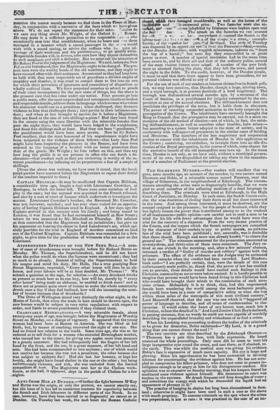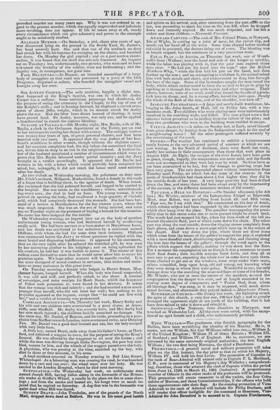THE GILHERTON MURDER.—Our readers will recollect that we gave, some
months ago, an account of the murder, by two carters named
Thomson and Dobie, of a miserable woman named Paterson, near the village of Gilmerton, in the neighbourhood of Edinburgh. The circum- stances attending the crime were so disgustingly horrible, that we were glad to avail ourselves of the softening medium of a dead language in describing them. The criminals were tried at Edinburgh, in the High Court of Justiciary, on Monday. In such cases, the Scotch Courts exer- cise the wise discretion of closing their doors to all but those interested in the issue. And among those interested, it must be observed, are the counsel assigned to the prisoners; for the people of Scotland, while they but lightly esteem the power that is attributed among us to the weakest of all instruments—public opinion—are careful not to send a man to be
tried for his life with fewer advantages than he would have were the trial for the recovery of a sixpence. From the very decent practice of
the Courts, and the respect which the Scotch newspapers are compelled by the character of their readers to pay to public morals, no particu. lars of the trial have been published ; nor, assuredly, was it desirable that there should. Enough and more was already known " to cleave the general ear." The witnesses summoned for the prosecution amounted to seventy-three, and thirty-nine of these were examined. The Jury re- tired at one o'clock in the morning, and, after a few minutes' absence, returned a verdict of "Guilty of murder and robbery" against both the prisoners. The effect of the evidence on the Judges may be estimated by their remarks when the verdict had been recorded. Lord Meadow. bank said—" I am perfectly certain, that, were the details of this case unfortunately made public, as, thank God, the power of law has enabled you to prevent, those details would have excited such feelings in this Christian communityas never were before excited. It is hardlypossible to imagine that persons would have been found living in this Christian land who would have brought their minds to the commission of such atro- cious crimes. Melancholy it is to think, that, had this unprotected female been wandering the world among the most barbarous people, she would have been in a state of comparative safety to what she was
within three miles of the metropolis of this most civilized country." Lord Moncreiff observed, that the case was one which it " beggared all
power of language to describe, and all terms of condemnation to cha- racterize. It would sicken the heart of any honest man, much less a Christian, to hear the details of it." And Lord Justice Clerk Boyle declared, in passing sentence, that no words he could use were capable of worthily describing the unparalleled brutality and wickedness of so foul a crime.
When his Lordship was proceeding to direct the bodies of the criminals to be given for dissection, Dobie exclaimed—"My Lord, it is a grand thing that you cannot dissect the soul ! " The two convicts are thus described by the Edinburgh. Observer.-- " Thomson has a pale thin face, with little expression. He heard
unmoved the whole proceedings. bely once did he cease to turn his large inexpressive eyes round the court, and cast them, as if abashed, to. the earth. This was while the medical man was giving his evidence
Dobie's face is expressive of much more sagacity. His eye is large and glowing. Since his apprehension he has been unwearied in devising schemes for counteracting the evidence against him. He has not scru-
pled to compromise his fellow-prisoner, who does not seem to possess in• telligence enough to be angry at him for his disingenuous conduct. His
agitation was so excessive on Sunday morning, that his keepers feared he meditated some violence against himself. His demeanour in court was restless in the extreme. He drank frequent and deep draughts of water ; and sometimes the energy,with which he demanded the liquid had an appearance of phrensy in it." The practice of hanging in chains has Tong been discontinued in Scot- land ; otherwise it might have been used in such a case as the above with much propriety. To execute criminals on the spot where the crime was perpetrated, is not so rare : it was practised in the case of an aa••
provoked murder not many years ago. Why it was not ordered in re- gard to the present murder, which was equally unprovoked and infinitely more revolting, does not appear. If life be taken away at all, surely every circumstance which can give solemnity and power to the example ought to be sedulously studied.
ALLEGED MURDER.—On Saturday, a girl, about nine years of age, was discovered lying on the ground in the Stable Yard, .St. James's, her head severely hurt. She said that one of the sentinels on duty had struck her with his bayonet for swinging on the chains, and knocked her down. On Monday the girl expired ; and on a post mortem exami- nation, it was found that the skull was severely fractured. An inquest sat on Tuesday; but, unfortunately, two persons, who were said to have witnessed the brutality of the soldier, were not forthcoming ; and the inquiry was, in consequence, not gone into. FAIR DECEIVERS.--At Bognor, an intended assemblage of a large body of smugglers on that coast was prevented by a party of the 15th Dragoons, disguised as sailors, who boarded the smugglers' vessel and brought away her crew.



























 Previous page
Previous page